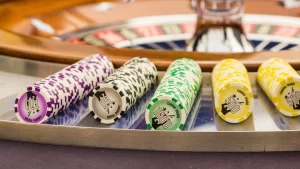
How to Not Lose Everything When Gambling
Gambling is a real problem. This not only drains your bank account, but it also strains relationships with loved ones, can cause you to be in debt and may even lead to anxiety or depression.
The first step to address this issue is recognizing that there’s a problem. A national hotline, treatment centers and clinics are available if you need them. Gamblers Anonymous groups can help — online or at local meetings.
Figure Out What Triggers You
There are so many things that can make someone want to gamble. It could be anything from a certain situation to a person or an emotion. That’s why it’s important to figure out what these triggers are so you can avoid them, and come up with strategies that will stop you from wanting to gamble again.
Relapse triggers vary widely from negative experiences such as losing money or winning the lottery to specific dates like payday or major holidays — and even sudden mood changes. Identifying each of your individual triggers will take time.
Other common gambling relapse triggers include: the gambler’s fallacy (belief that losing one time means winning next time), superstitious thinking, an urge to escape reality or prescription drugs known to increase risky gambling behaviors.
To counteract these feelings when they arise, try deep breathing exercises or meditation; get support from friends and family; prioritize taking care of yourself like exercising regularly and getting enough sleep; replace gambling behavior with hobbies or spending quality time with loved ones over time!
Put a Limit on It
Debt is probably one of the biggest obstacles when trying to break the cycle of addiction. One way you could try controlling how much you’re spending is by setting deposit limits for your accounts.
These apps will set a spending cap and lock you out once your spending exceeds this threshold; other apps allow gamblers who struggle with spending too much time online playing games that do not provide monetary rewards track how much time they’re spending on each game.
If the financial side of problem gambling is becoming difficult, consider seeking help from a nonprofit credit management agency. They will review your finances and set a budget for you to get out of debt; they may also recommend programs that will give you back control over your credit cards or loans.
Avoid Boring Situations
Sometimes people gamble as a way to feel better about themselves. Breaking these habits means learning new ways to cope with feelings like this. Some alternatives include: exercising regularly, spending time with non-gambler friends and using relaxation techniques. Treatment programs can help teach these skills.
As current and ex-gamblers probably already know, boredom is one of the easiest ways to relapse. To avoid getting sucked back into this habit it’s important to keep yourself busy — create schedules for day-to-day tasks and on weekends, run errands and renew old hobbies (or start new ones)!
Other tactics include: leaving credit cards at home or bringing only enough cash for what you need, avoiding high-risk situations and watching less sports programming if it makes you want to bet money. You may also benefit from identifying negative thought patterns like irrational beliefs or the gambler’s fallacy
It’s important that gamblers know how to take a break and avoid triggers. Simple things like taking an alternate route to work, or switching off the sports channel so there are no scores available during the day can help.
Find out why they gambled — was it because they were bored? did something in their environment encourage them? — and see if you can address those issues with them. For example, if boredom is a trigger suggest picking up a new hobby or reading more, both of those activities can be done for free.
If you or someone you know has a gambling addiction please consult professional help immediately. There are several organizations offering support services for problem gamblers such as Gamblers Anonymous; which would be a good place to start.
Helping someone in your life who has an addiction navigate their journey isn’t easy but it is necessary. Have open conversations with them about their habits and set boundaries from that conversation, if possible encourage them to contact a gambling counsellor or self-exclusion program for advice and guidance.


